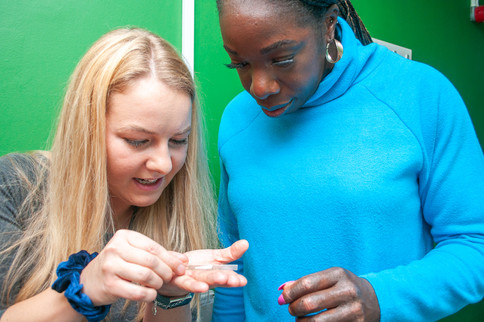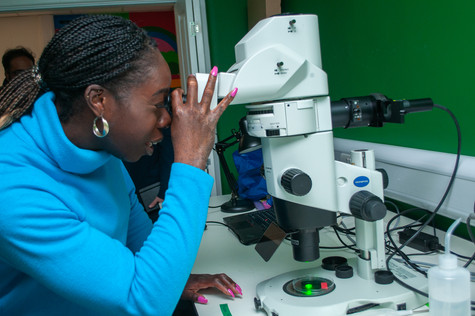World-leading Science In Liverpool – Labour MPs Visit Liverpool School Of Tropical Medicine & Innovative Vector Control Consortium (IVCC)

On Friday the 8th of December, Malaria No More UK hosted a visit to the Liverpool School of Tropical Medicine (LSTM) and Innovative Vector Control Consortium (IVCC), alongside Liverpool MPs Kim Johnson and Paula Barker, Prospective Parliamentary Candidate Dr Zubir Ahmed, and Malaria No More UK ambassador Anyika Onuora.
British-backed science has long been at the forefront of the global fight against malaria – a disease which still claims the life of a child every minute – and LSTM and IVCC are at the heart of the research and development necessary to build the tools needed to end malaria in our lifetimes.
The success of these institutions shows the importance of long-term funding for malaria research, and the need for continued investment to ensure that British led innovation remains at the cutting edge of tackling malaria.
The visit comes after the publication of the 2023 World Malaria Report by the World Health Organisation, which confirms that malaria cases and deaths are still way above pre-pandemic levels.
The visit involved Kim Johnson (MP for Liverpool Riverside), Paula Barker (MP for Liverpool Wavertree), Dr Zubir Ahmed (PPC for Glasgow Central and South West), and Anyika Onuora (Malaria No More UK Ambassador), Professor Martin Donnelly (LSTM) and Justin McBeath (IVCC).
The group toured IVCC and LSTM's groundbreaking facilities, where advances in the fight against malaria are being developed. They met senior scientists leading projects to develop the vital tools needed in the fight against malaria, as well as some of the team behind the development of next generation insecticide treated mosquito nets. This tool will play a crucial role in ensuring that growing insecticide resistance is prevented from rolling back the progress of recent decades.
'Along with our partners at Malaria No More UK, we welcome the opportunity to meet with local MPs to show the impact of Liverpool School of Tropical Medicine’s research into malaria and other diseases, and discuss how investment in innovation and health research carried out here in the North West can make a huge difference in saving lives all around the world.' - Professor David Lalloo, Director of the Liverpool School of Tropical Medicine.
IVCC was established in 2005 and focuses on the control of vector-borne diseases like malaria. The organisation brings together industry, academics, the not-for-profit and public sector to create innovative solutions for global health problems. IVCC has a robust pipeline of novel insecticides for use on bed nets and indoor residual sprays, designed to address the threat of insecticide resistance.

Since 2002, malaria deaths have been cut in half and the UK has played a huge role in that success as a leading funder of global infectious disease research and science. But there are still over half a million deaths every year from malaria, and experts warn that funding barriers, drugs resistance and emerging challenges due to climate change and changing weather patterns are jeopardising progress made to end the deadly disease.
These challenges show why it is imperative that funding continues to the global institutions that ensure these vaccines and other lifesaving tools reach those who need them most. All political parties must recommit to the fight against malaria and continue to back the British life sciences sector so that scientists can finish the job and develop a full set of tools against an unpredictable and ever-adapting disease.
'Liverpool has a long history of innovation and being at the cutting edge of science and research.' - Dr Zubir Ahmed, Prospective Parliamentary Candidate for Glasgow Central and South West.
Dr Astrid Bonfield, CEO of Malaria No More UK, said: 'The UK has a proud history in fighting global infectious diseases like malaria and pioneering science, research and innovation. There is no shortage of talent amongst British scientists and the research taking place at their institutions can save lives around the world. Our science institutions urgently need continued investment in this research to be able to develop innovative new tools which finish the job and end malaria for good.'
Malaria No More is a UK charity determined to end malaria by inspiring UK public, businesses and government to fight for a malaria-free world.
Professor David Lalloo, Director of the Liverpool School of Tropical Medicine, said: 'Along with our partners at Malaria No More UK, we welcome the opportunity to meet with local MPs to show the impact of Liverpool School of Tropical Medicine’s research into malaria and other diseases, and discuss how investment in innovation and health research carried out here in the North West can make a huge difference in saving lives all around the world. As the COVID pandemic demonstrated, infectious disease does not respect borders in our interconnected world, and it is in all our interests to ensure that we address the greatest global health challenges we still face.'
Founded in 1898, Liverpool School of Tropical Medicine (LTSM) was the first institution in the world dedicated to research and teaching in the field of tropical medicine. Their work in combating diseases such as TB, HIV/AIDS, and malaria has earned them a worldwide reputation and their state-of-the-art facilities continue to develop new drugs, vaccines and pesticides which put them at the forefront of infectious disease research.
Kim Johnson, MP for Liverpool Riverside, said: 'Today we met the team behind the development of next generation insecticide treated mosquito nets which are helping to counter threats to ending malaria, such as increasing drug resistance. This is just one example of where Liverpool’s global leadership in health and life sciences is resulting in life saving breakthroughs.'
Dr Zubir Ahmed, Prospective Parliamentary Candidate for Glasgow Central and South West, said: 'Liverpool has a long history of innovation and being at the cutting edge of science and research. Labour has stressed the importance of long-term funding for the life science sector, and the research and development taking place at these institutions is saving lives across the world.'
(Credit: Image was provided to The Liverpudlian to share, courtesy of the Publicist on behalf of their client. We make no claim to this content).
Anyika Onuora’s Incredible Story
Ten months before Anyika Onuora won bronze with the GB 4x400m team at the Rio Olympics in 2016, she was in hospital with life-threatening malaria and thought she might die. Her health ordeal began in October 2015 during one of her regular visits to her late father’s village of Nri in Nigeria. Not realising she had contracted one of the most deadly strains of malaria, she returned home to Liverpool and then on holiday to the Dominican Republic. As her health deteriorated further, Onuora managed to drive herself from Loughborough where she’s based, to a specialist hospital in London where she collapsed as she got out of her car.
During the next few hours her body started shaking uncontrollably and as she describes the pain in her brain and forehead were unbearable. Her temperature was now 39 degrees so to cool her body down her bed was filled with ice. Exhausted, she wasn’t allowed to sleep in case she lost consciousness. She remembers thinking she was going to die.
Onuora was transferred to a tropical disease unit at UCL hospital and made a slow recovery. Upmost in her mind were the Rio Olympics, but she couldn’t walk let alone run a professional race. Determined to get fit again she started to train but having lost all of her strength, she was unable to walk a short distance without collapsing.
She began with a daily 15 metres walk around the ward, trailing her drip. Gradually she jogged a few steps, but it took many weeks before she could start doing 150m, 200m, 350m. The medical team were really impressed but told her not to rush as her health was more important. In an amazing 40 weeks she moved from having a serious life-threatening illness to the Olympic podium.
Anyika Onuora, Malaria No More UK ambassador, said: 'I know that I am lucky to have survived malaria when so many don’t. Knowing that a child dies every minute from the same disease I pulled through is heart-breaking. I’m fortunate not just be alive but to keep doing what I love – running. And I’m determined to help however I can to make malaria no more.'










_C.png)























Comments